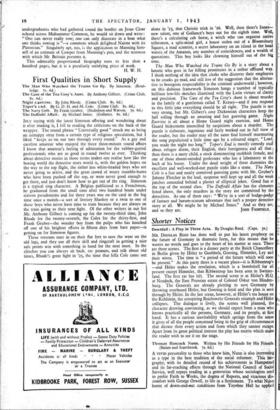First Qualities in Short Supply
The Man Who Watched the Trains Go By. By Simenon. (Routledge. 75. 6d.)
The Case of the Tea Cosy's Aunt. By Anthony Gilbert. (Crime Club. H. W.) Night Exercise. By John Rhode. (Crime Club. 8s. 6d.) Toper's End. By G. D. H. and M. Cole: (Crime Club. 85. 6d.) The Navy Colt. By Frank Gruber. (Nicholson and Watson. 7$. 6d.) The Daffodil Affair. By Michael Innes. (Gollancz. 8s. 6c1.) IDLY toying with the latest Simenon offering and wondering about it after reading it, I fell to reading the criticisms on the back of the wrapper. The round phrase "Universally good" struck me as being an unhappy stray from a certain type of religious speculation, but I liked "keeps us on our toes through every round." As a gay and carefree amateur who enjoyed the three three-minute round affairs I know that amateur's feeling of admiration for the rubber-gutted professionals who are as good in round twelve as ever. Thinking about detective stories in those terms makes one realise how like the boxing world the detective story world is, with the golden hopes on the way to the top flight, the rather less white-headed boys who are never going to arrive, and the great crowd of weary stumble-bums who have been pushed off the top, or were never good enough to get there, and just don't know how to get out of the ring. Simenon ii a typical ring character. A Belgian publicised as a Frenchman, he graduated from the small time after two hundred bouts under sixteen pseudonyms and for three years was on the card in the big time once a month—a sort of literary Sharkey or a twin to one of those boys who never have time to train because they are always on the train going to their next fight. Of the other writers in our list Mr. Anthony Gilbert is coming up for the twenty-third time, John Rhode for the twenty-seventh, the Coles for the thirty-first, and Frank Gruber—the wonder boy from the pulps who has knocked off one of his brighter efforts in fifteen days from bare paper—is getting on for Simenon figures.
These veterans start in on their flat feet to save the wear on the old legs, and they use all their skill and ringcraft in getting a nice safe points win with something in hand for the next meet. In the clinches you can always sit back, eat peanuts, and talk about old times, Rhode's great fight in '25, the time that fella Cole came out
alone in '23, that Christie trick in '26. Well, then there's Lanes— new talent, one of Gollancz's boys out for the eighth time. Well, there's a calculating cab horse, a witch who can organise native tribesmen, a split-mind girl, a house stolen out of a Bloomsbury Square, a mad scientist, a secret laboratory on an island in the head waters of the Amazon, any number, of coincidences, and a wealth of quotations. This boy looks like clowning himself out of the big time.
The Man Who Watched the Trains Go By is a story about a lunatic who goes in for killing prostitutes in a rather offhand way. I think nothing of the idea that clerks who discover their employers to be crooks go mad, and still less of the suggestion that the alternative to bourgeois respectability is the criminal underworld ; however, on this dubious framework Simenon hangs a 'number of typically brilliant low-life sketches illumined with the Latin virtues of clarity and precision. The Case of the Tea Cosy's Aunt is about murder in the family of a gentleman called T. Kersey—and if you respond to this little joke everything should be all right. The puzzle is not very strong, but Mr. Gilbert's cosy Dickensian characters keep the ball rolling through an amusing and fast guessing game. Night Exercise is all about a Home Guard night exercise, and Home Guard bickerment intensified by suspicions about a murder. The puzzle is elaborate, ingenious and fairly worked out in full view of the reader, but the reader may all the same find himself murmuring the song popularised a little time ago by a coloured singer, "Lord, you made the night too long." Toper's End is mostly comedy stuff about refugee aliens, their English, their foreignness and all that ; then there is a nasty child, a stock domineering snobbish female, and one of those absent-minded professors who has a laboratory at the back of his house. Under the dead weight of these dummies the excellent and well-worked-out puzzle sinks like a stone. The Navy Colt is a fast and neatly contrived guessing game with Mr. Gruber's Johnny Fletcher in the lead, suspense well kept up and all the weak patches concealed behind a plaster of elliptical jokes. Good fun at the top of the second class. The Daffodil Affair has the elements listed above, the only murders in the story are committed by the detectives. As one of them says : "We're in a sort of hodge-podge of fantasy and harum-scarum adventure that isn't a proper detective story at all. We might be by Michael Innes." And so they are,
and so they are. JOHN FAIRFIELD.






















 Previous page
Previous page